Chinese manufacturing is hitting amazing heights today. Just 15 years ago, if you bought a Chinese motorcycle, there was a high chance that it was a pile of crap. Today, Chinese motorcycles can be quite desirable – and as an Autopian reader, you already know the great strides the Chinese automotive industry has made. Now China is leaning heavily into the RV industry, which is resulting in some really cute and dirt-cheap campers becoming available. There’s a chance you’ve seen the same Chinese camper that caught my eye, the Aiymen TT-C1. This fiberglass camper claims to have vintage looks and the kind of modularity that you get with Lego bricks, all while costing just $8,000. But here’s a twist: from what I’ve been seeing, it is not as it appears to be.
One of the weird benefits of having a Chinese-market phone (a Vivo X200 Pro that I imported just for its cameras, thanks for asking) is that I have access to Chinese social media. A heartwarming thing I’ve found is that Chinese social media is just like American social media, where people do stupid things for clicks. My X200 also affords me a glimpse at car culture in China, and that’s great too, but it has also exposed me to something less awesome.
The $8,100 Aiymen TT-C1 is a beautiful piece of work, made of fiberglass and featuring a fully modular floorplan. Autoevolution wrote about this trailer earlier today, with good vibes. But here’s the problem: The promotional video for the trailer and the imagery appear to be taken from another manufacturer. And it only gets worse from there.
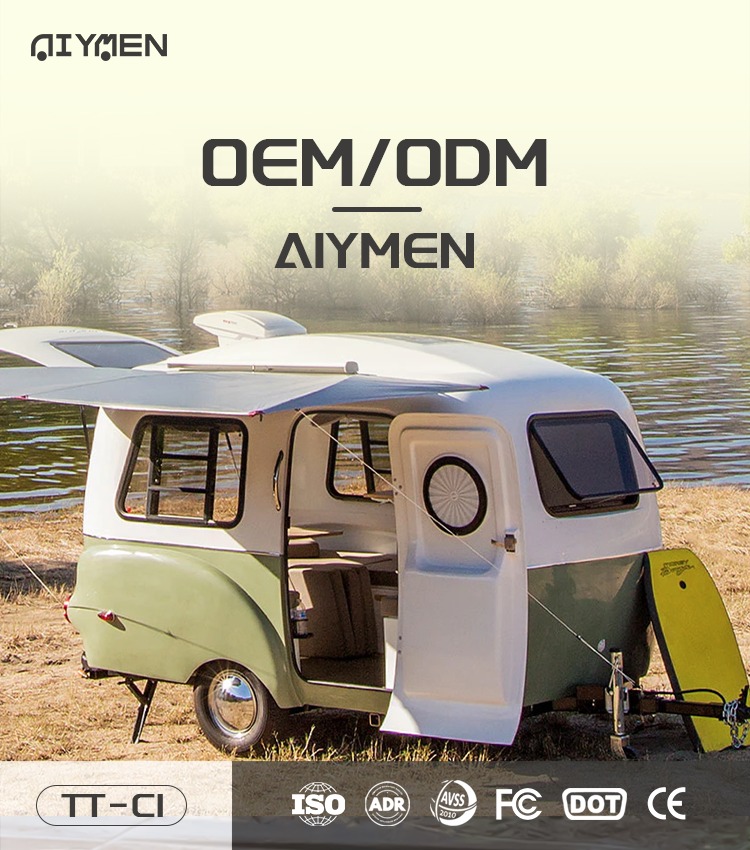
Aiymen Technology’s Claims
You can buy the TT-C1 from Aiymen Technology Co., Ltd.’s listing on Made-In-China.com, and if you look no deeper than the surface, it seems legitimate. The listing page gives you prices in U.S. dollars, and the images claim that the trailer is FCC, CE, and U.S. DOT certified.
Clearly, this trailer is being marketed to Americans, and with a price as low as $8,100, who cares if it’s hit by tariffs, because even if you had to cover a 100-percent tariff, it would still be cheaper than similar offerings for sale in America. This camper is even cheaper than a brand-new Scamp! Here’s what it supposedly actually looks like:
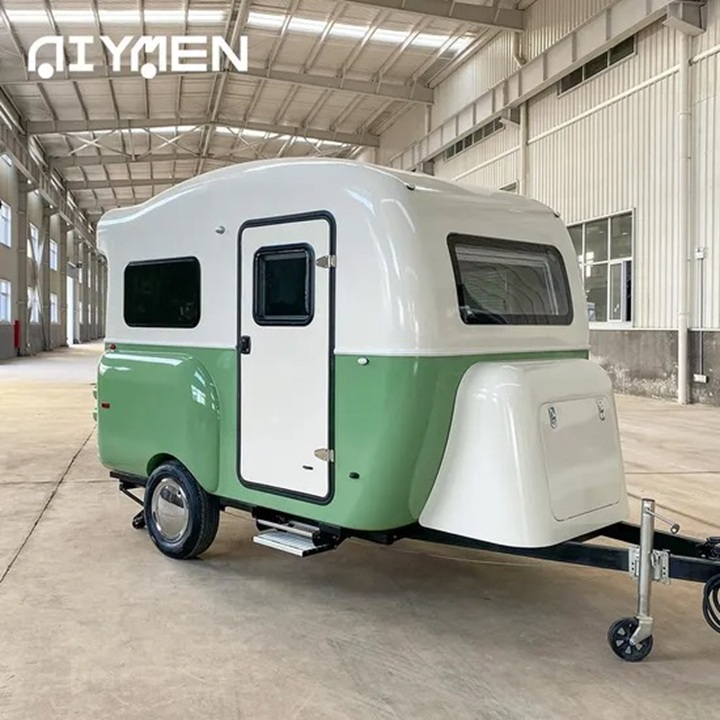
I’ve done some digging on Aiymen Technology Co., Ltd., and I couldn’t figure out when the business opened, but I did discover it’s only been on Alibaba for a year. The company’s Conformité Européenne (CE) is valid from 11/14/2024. I could not locate the manufacturer’s apparent registration with NHTSA, as it claims to have. The company’s about page currently reads:
Aimens is a leading RV manufacturer in China, employing over 300 people and covering an area of 20,000 square meters, with an annual turnover of 50 million yuan. Our products are exported to Australia, North America, and various other regions. With advanced research and development capabilities, our factory is equipped with cutting-edge technology, such as Tumpf laser cutting machines, OTC welding robots, and AMASA CNC punching and bending machines, ensuring the highest product quality.
All Aimens products comply with industry standards and hold various certifications, including VIN, WMI (World Manufacturer Identifier), CE, ISO, COC, and others. These certifications guarantee our products meet international safety regulations and quality standards. We welcome you to visit our factory anytime to see for yourself the quality we uphold. For more information or to customize your camping trailer, please feel free to contact us. Aimens is excited to provide you with outstanding products and services for an unforgettable camping adventure.
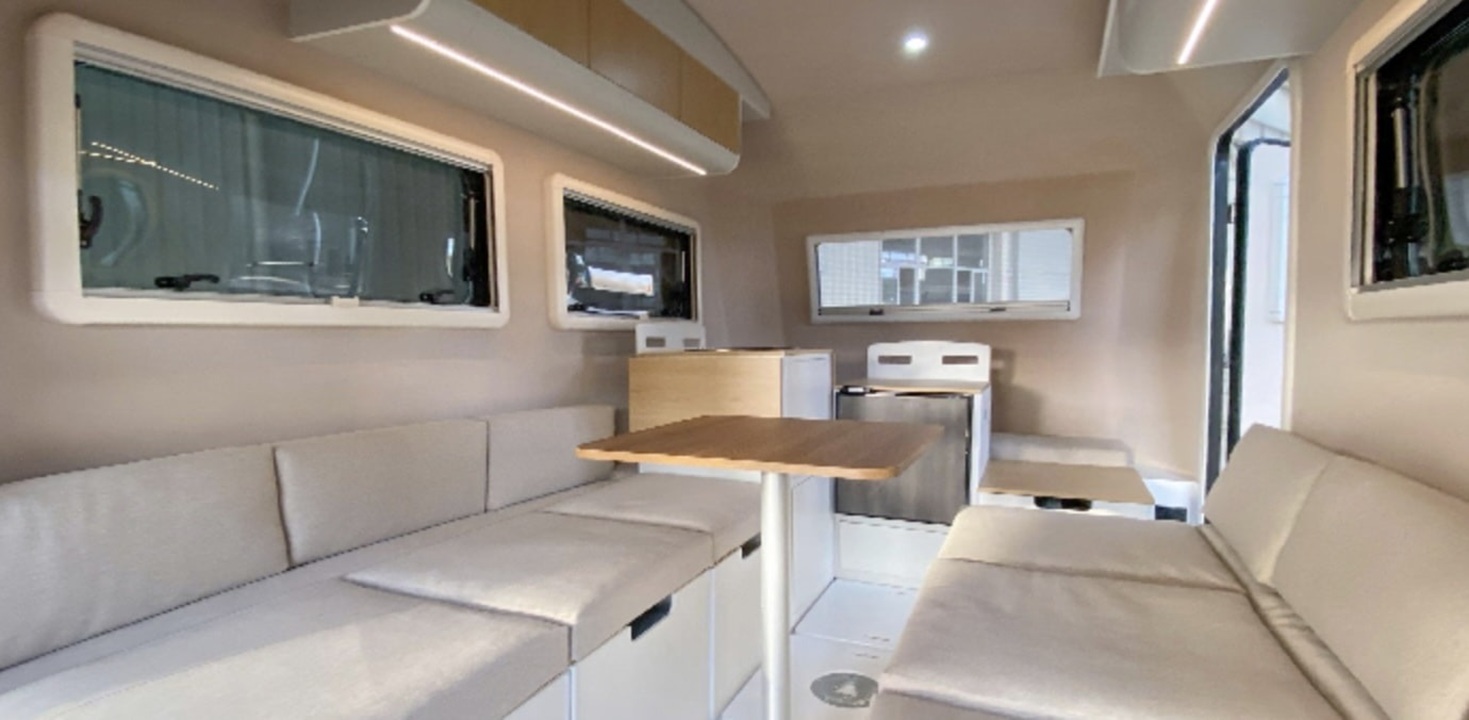
To further illustrate how much this company wants you to think that it’s a player in North America, it says that the North American market makes up 40 percent of its production. My problem is that it’s hard to believe anything that this company says seriously, given how it markets its products.
Right, so here’s the Aiymen TT-C1. Aiymen says that this camper is made out of two fiberglass halves that are bonded together, not unlike the classic American fiberglass camper. The trailer measures 16.9 feet long with a 10.2-foot-long box and a weight of 1,874 pounds. Other features include a 100 Ah battery, a galvanized steel frame, a torsion beam axle, acrylic windows, and electric brakes.
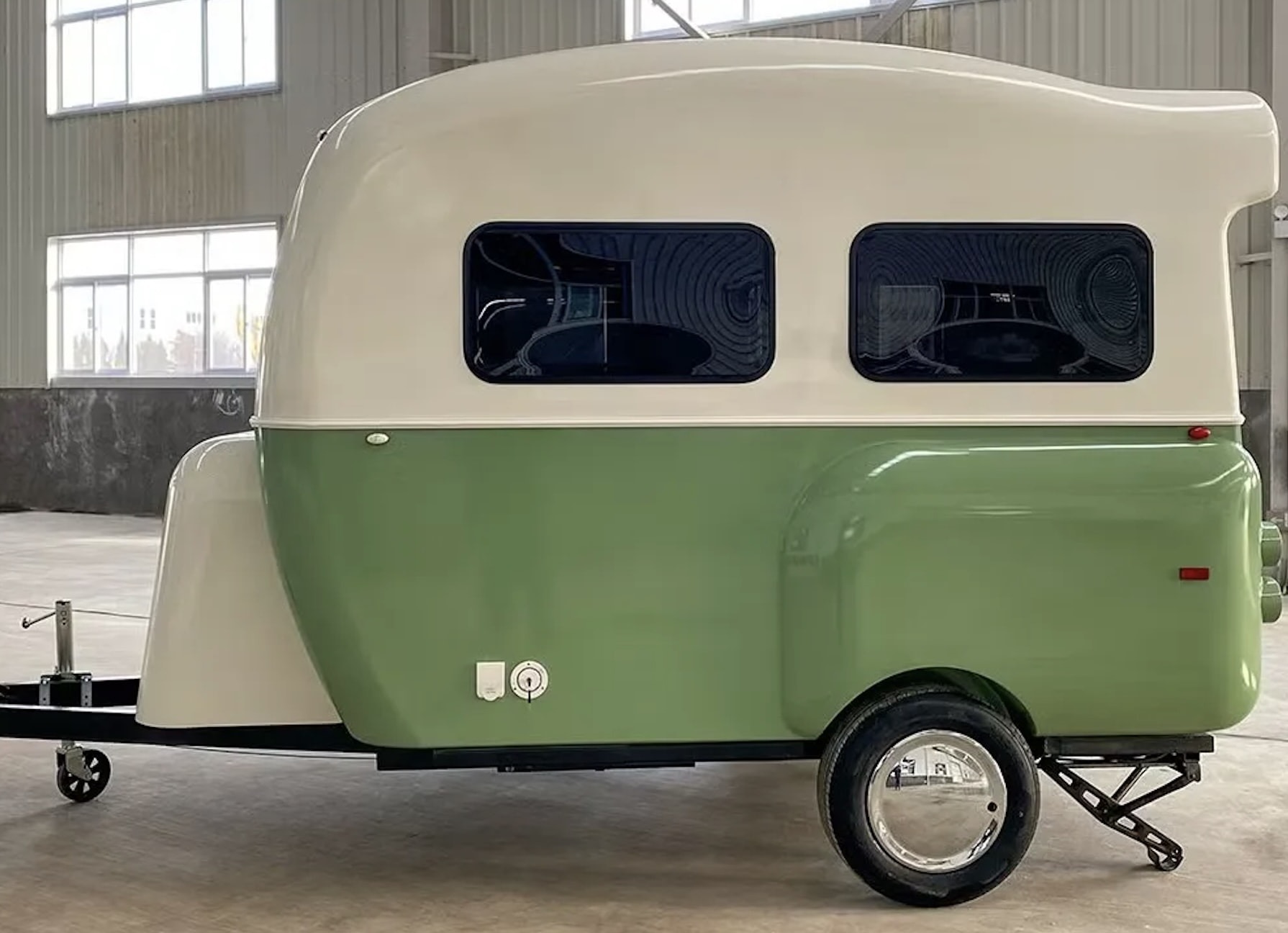
The biggest feature, of course, is the modularity. Images provided by Aiymen show an interior full of cubes that you can move around or remove entirely from the trailer, giving you a modular interior with a Lego-like ease of use.
But wait a second, something is off about this camper. Take a look at the hero shot of this camper. This is from Aiymen’s site:
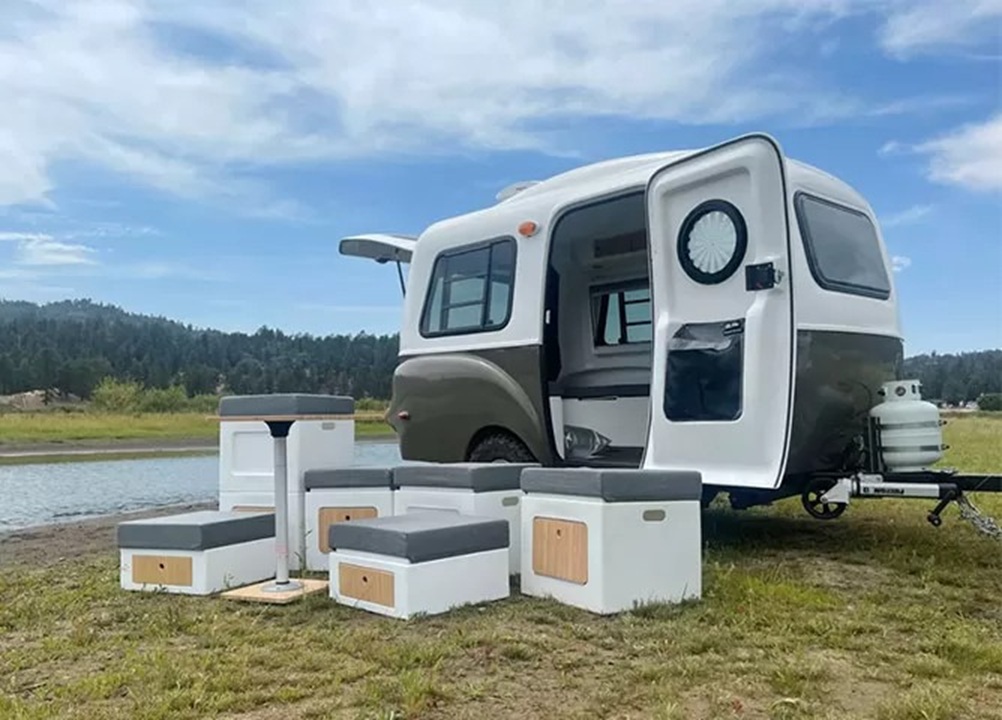
If it looks familiar but you can’t put your finger on it, don’t worry, I got it. The photo here is for the Happier Camper HC1 Studio, a camper built in Los Angeles, California, not China. Here’s the topshot that I made for my Happier Camper article back in 2022:

At first, I thought that maybe some lazy intern making the for-sale listing just took whatever photos they could find, but I cannot even give Aiymen that benefit of the doubt. I found the company’s actual website, and it’s somehow so much worse. Not only does the Happier Camper show up all over the site as a product of Aiymen, but Aiymen might have borrowed the images of other RVs, too.
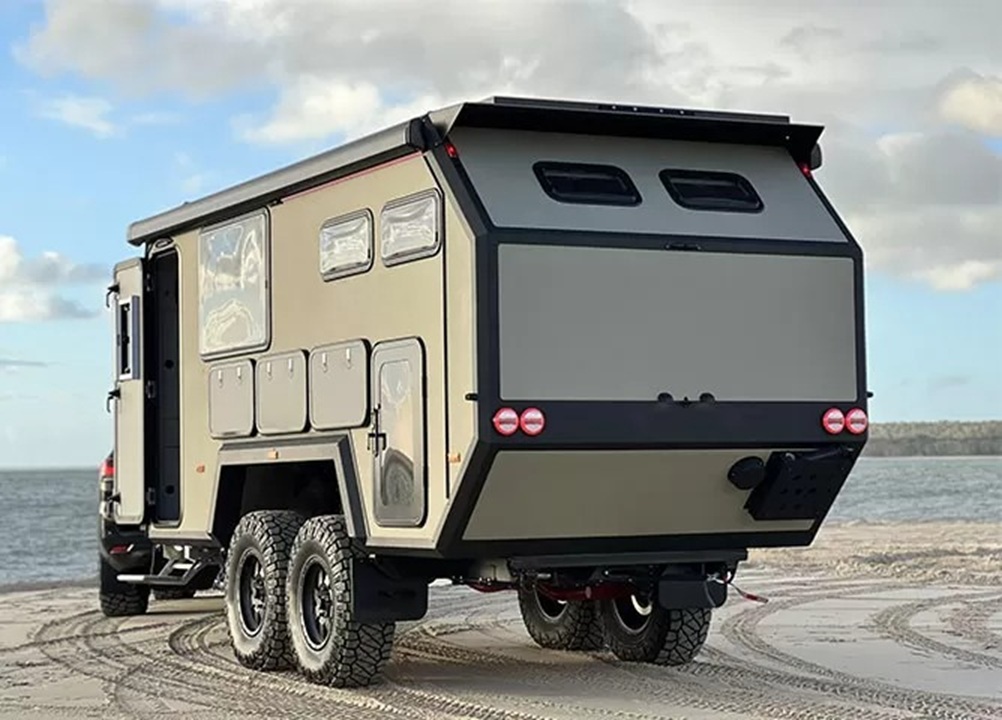
Here’s the Aiymen ‘HC-C5 Hybrid Caravan‘ above. What do you think this camper really is? What you’re looking at here is a Brüder EXP-8, which is from Australia. The Aiymen ‘HC-C4 Hybrid Caravan‘ is also another Brüder design.
Things get weird when you go to Aiymen’s catalog of teardrop campers. Here’s the Aiymen TT-A2:
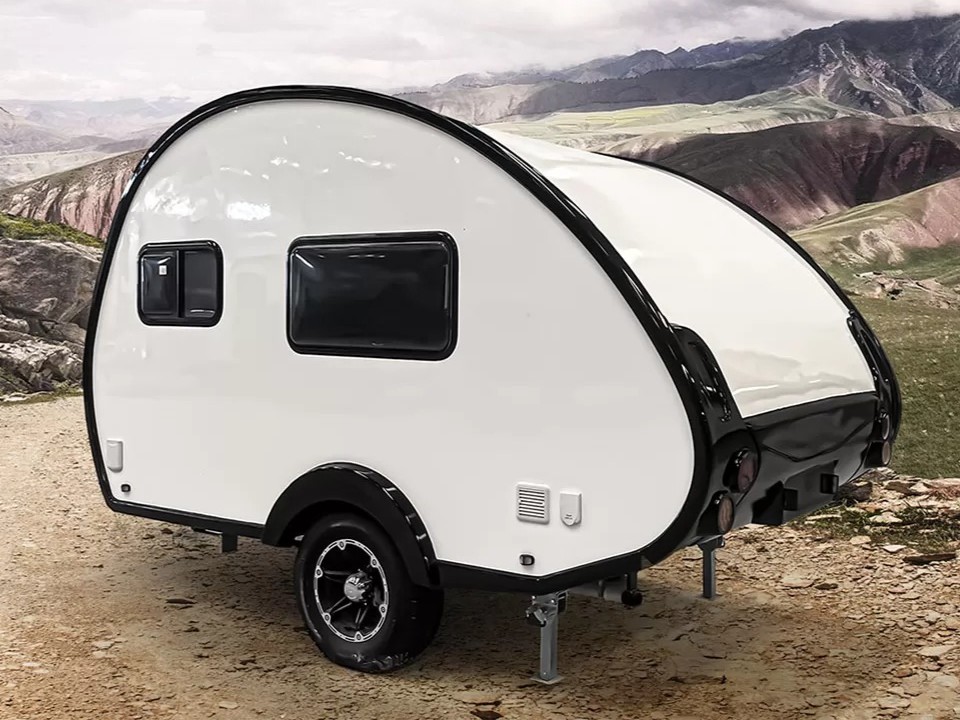
Now this camper does not seem to borrow another manufacturer’s images. But its design is the spitting image of the nuCamp Tab 320 Lite, which is built in Ohio:
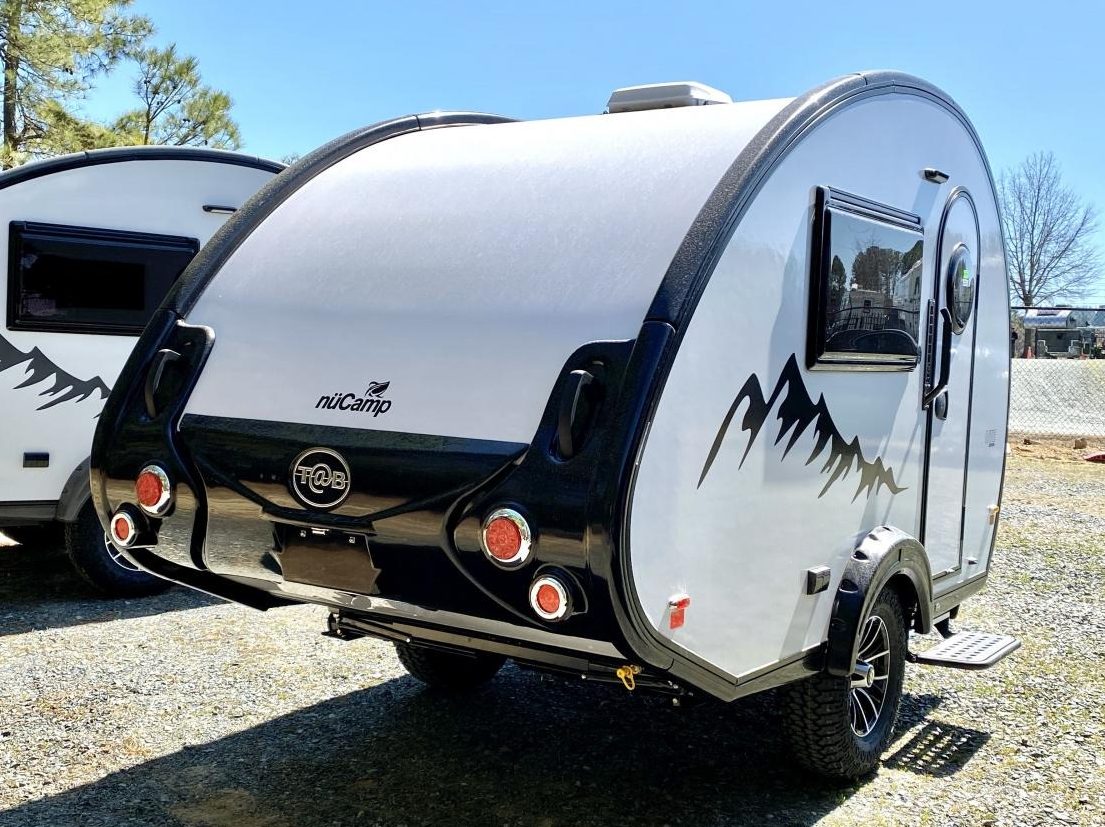
The boldest one is the Aiymen ‘TT-B1 Teardrop Trailer‘ below. This one blows my mind because it’s a super unique design. This is actually the Mink Camper Mink-S, which is designed in Iceland and built in Latvia.
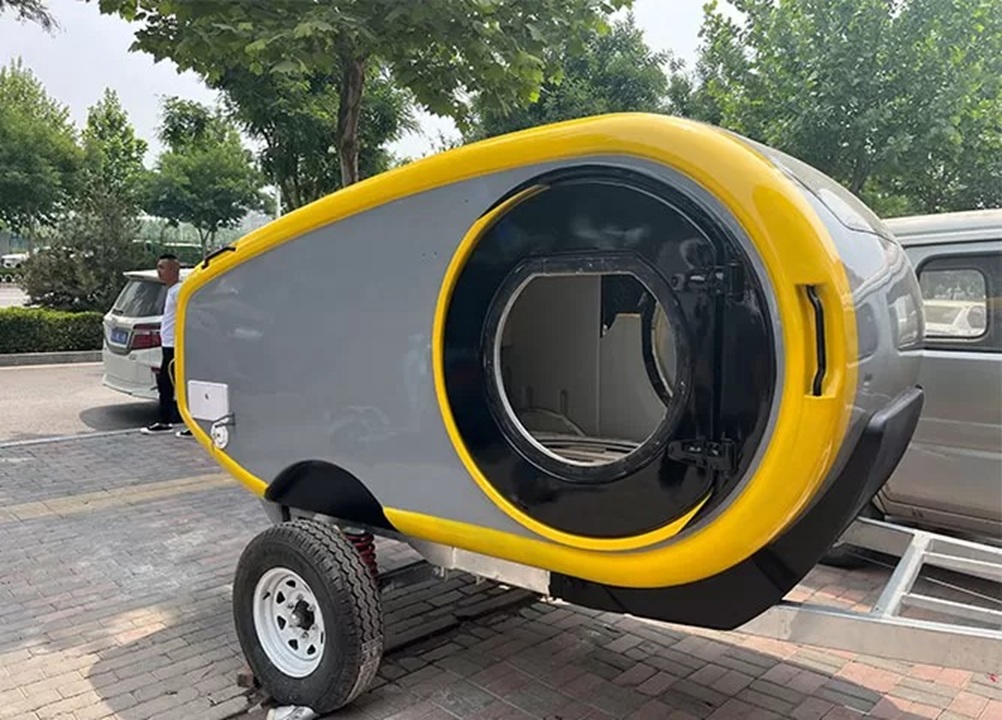
In this case, Aiymen is not borrowing Mink Campers’ images, but appears to have obtained the camper’s design somehow. This is also the case for the Hebei On The Road Comma-E, which is also a near-exact clone of the Mink Camper. Amazingly, these things do exist. You can even rent a Hebei On The Road Comma-E on Outdoorsy.
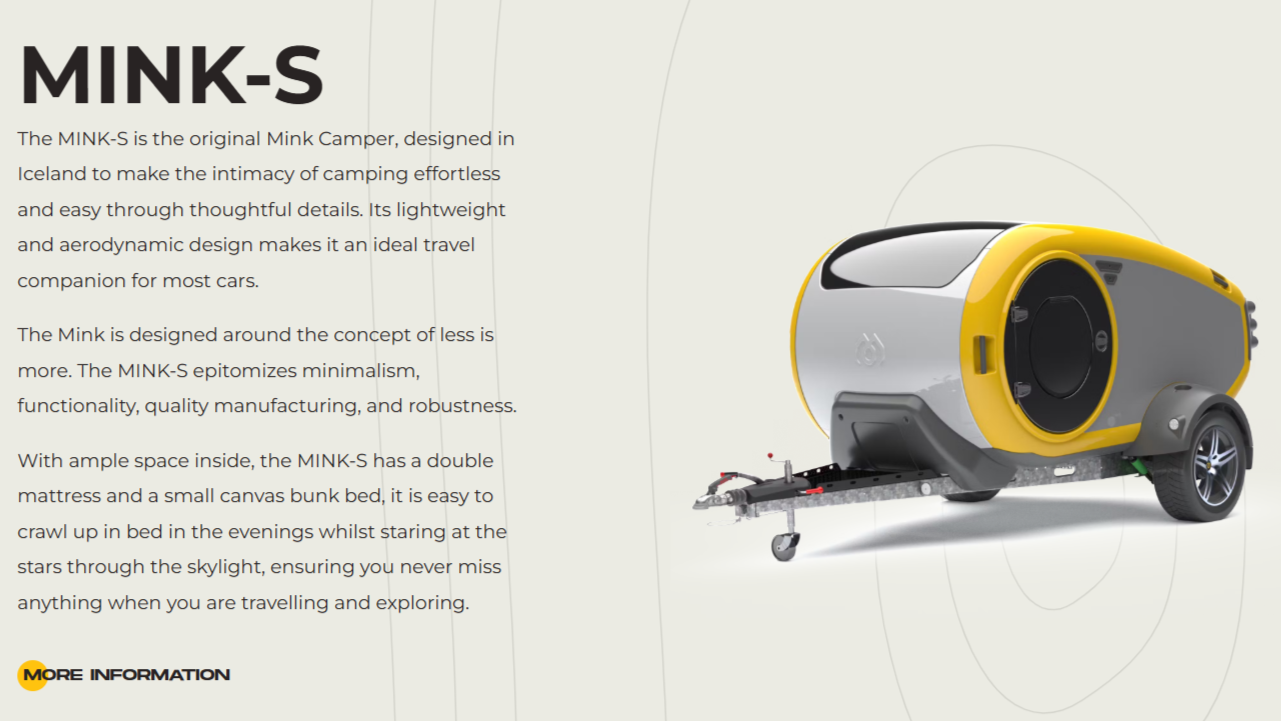
So what are we looking at here? It appears there are two things going on, and neither of them is promising. In the case of the HC-C5 Hybrid Caravan and the TT-C1, Aiymen has seemingly borrowed the images from Brüder and Happier Camper, respectively.
The wild part is that the TT-C1 appears to be a real camper. It doesn’t look nearly as good as a Happier Camper, but it looks like it might exist in some way or form. Why didn’t Aiymen just use its own images for this camper? It makes you think that you can’t trust anything that you see on Aiymen’s website. The company could make perfectly okay campers, but it’s almost impossible to tell.
Even worse is Aiymen’s promotional video for the TT-C1, which is just a video of a Happier Camper (Screenshot in case the video gets taken down):
The other deal going on here is that it looks like Aiymen is selling clones of campers from more famous brands. As I said earlier, the Happier Camper is built in California, the Mink Camper is built in Latvia, and nuCamp’s trailers are built in Ohio. No doubt, these companies almost certainly use parts from China, but these trailers aren’t built there.
I have reached out to Happier Camper to see if the company is aware of what’s going on here. A Happier Camper representative told me:
“We have become aware of a number of outfits based in China infringing on our IP, especially image rights. We issue take downs and another pops up. It helps a lot to spread the word so thanks again.”
Normally, I can find myself getting excited about affordable Chinese products, but this time, I just cannot. There’s no way of knowing that if you placed an order for one of these campers, you’d get anything even remotely similar to what you see in the images. Even if the campers here are 100 percent legitimate, if the company is willing to cut corners on imagery, how am I supposed to trust that the company also isn’t cutting corners on quality? Here’s what the TT-C1 allegedly looks like for real again:
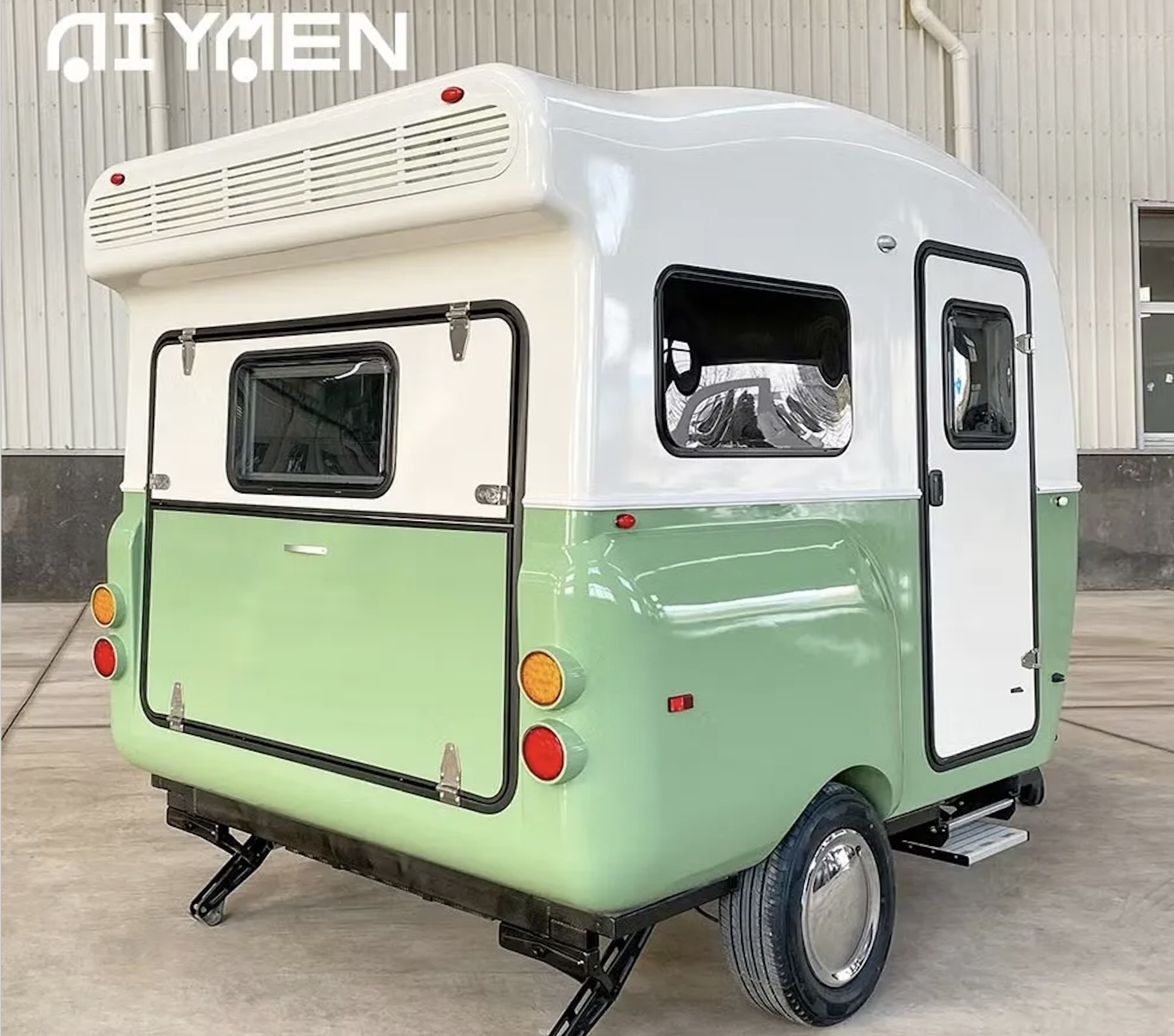
Some of you might be wondering why I even bothered to write this post. I wrote this because I know some of our readers are like me and probably occasionally scroll through Chinese marketplaces. It can be tempting to blow $8,100 on the TT-C1 because, again, even with tariffs and the cost of shipping, this thing will be cheap! However, there are so many red flags here that I would recommend staying away.
This is not to say that you should swear off Chinese products. I’m very happy with my Vivo X200 Pro and my CFMoto Papio SS. China does build some great products! However, as you’ve seen here, not every buy is going to be like that. So be careful.
The good news is that there are real versions of all of the campers that I’ve featured here. Yes, all of them are significantly more expensive than the ones Aiymen is slinging. There’s no doubt that a real Happier Camper is crazy expensive. However, at the very least, in spending tons of money on these campers, you know exactly what’s going to be parked in your driveway.
Top graphic image: Happier Camper

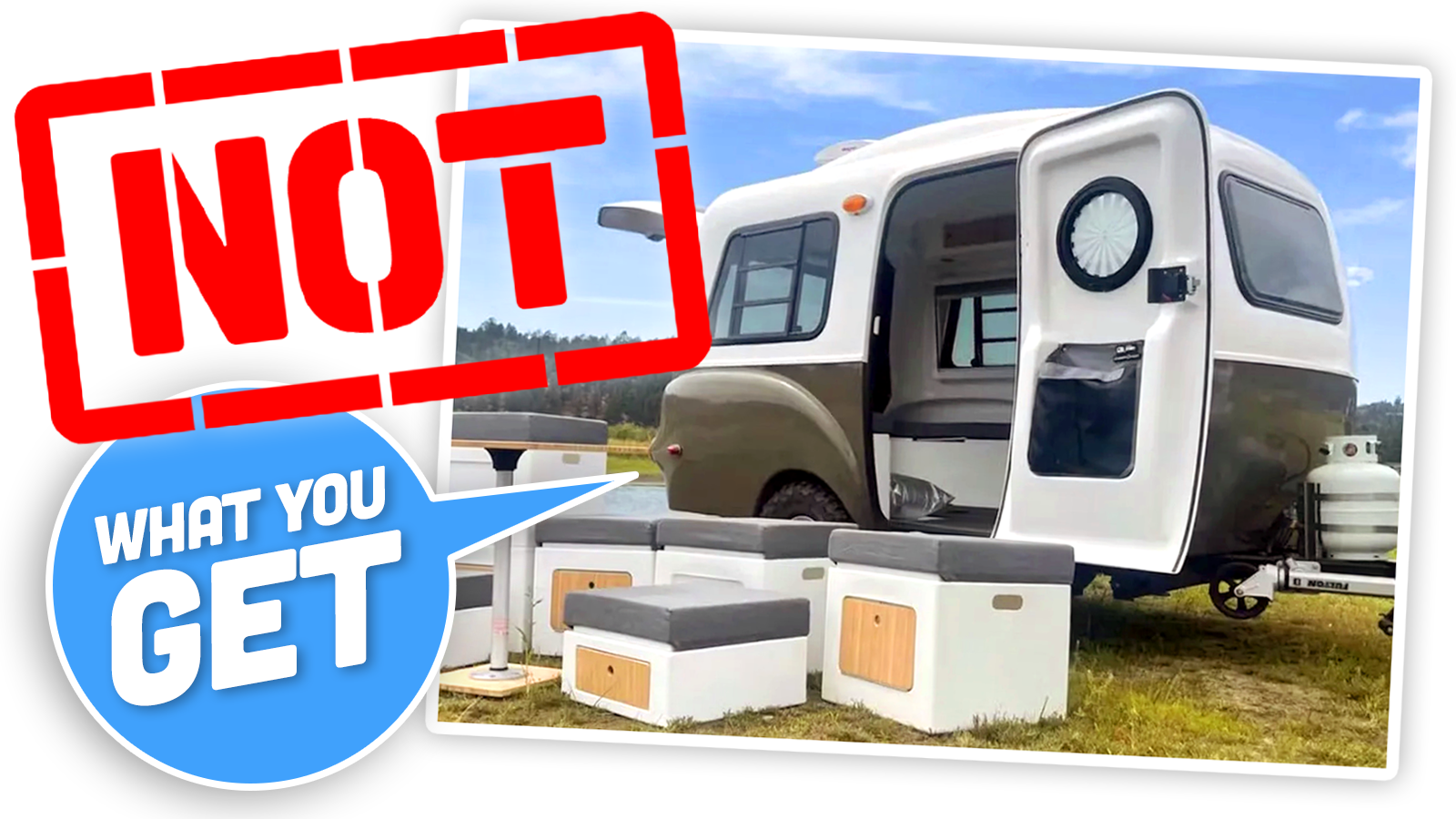







It’s good that you brought this to light, and IP theft is a real issue that nobody should help facilitate. The caveat is that your articles about the poor quality of your family’s Mallard highlight that paying full price for name-brand is just as much of a crapshoot as buying a Chinese knockoff. What is a person to do?
They stole the images and the idea from Happier, but the end product is not an exact copy. The Aiymen camper has a squarish wheel hump, while the Happier camper has a sloping front edge. The rear window is rectangle on the Aiymen, vs parallelogram on the Happier. And the Aiymen has a very pronounced snout thing on the rear of the roof that houses the AC. The AC on the Happier is an optional tack-on unit. The rear hatch on the Aiymen is two piece with a fold-down panel, which is useful for a table or bench surface. The Happier just has a 1 piece swing up tailgate. Aiymen has 4 raygun style round tail lights vs 2 conventional tail lights on the Happier. And the Aiymen has a shroud for the propane tank instead of it being exposed.
So although it sucks that they ripped off images from Happier, you could arguably say that the Aiymen seems to have made some improvements over the Happier.
I used to run Brand Protection for a consumer electronics company and you hit the nail on the head. Chinese IP law is not precedent based like in the entire west. Chinese law (In function) dictates that if you make a product better by improving it, you create a new product on your own- There’s no logo’s or branding going on these knockoffs, so no harm to your brand. It’s infuriating because all they do is take some throw away “Upgrades” that you may have chosen to not include on your product, put them on and now it’s a “better” product even though it looks and feels just like yours……..
Of course Mercedes would also be into unusual phones as well! I love it.
Definitely the same kind of mindset as me, maximizing bang for the buck. I’ve also imported my own cars just like she has to get maximum buying power. I’ve had a couple Redmi phones, and they worked well for me. Issue is the lack of 5G bands for T-Mo service, which lots of MVNO operate on. I bet Mercedes is also using a value oriented MVNO!
So now instead manufacturing products that are copies of other products, they just made things simpler and created a virtual company that doesn’t manufacture anything, they just copy images and generate hype.
Chinese companies stealing IP?! Such a thing is unthinkable and unheard of.
This is a tale as old as time, or at least to the late 90’s for me. Back then, as now, there was no limit to the shameless copying of IP. Back in the day we always suspected that when we contracted a Chinese company to make something for export they made double the amount and sold the rest to the local or regional market. Now with Alibaba and Temu they can just sell it everywhere.
Because origin of time was late 90’s
Mentioning chinese quality while the equivalent american products are…well, garbage, is hilarious.
If your Chinese one breaks down at least it was cheap.
When your American one breaks down, at least it cost 2x as much??
American companies either need to build better, or price better. They’ve needed a market reset/competition for a long time now.
Those are both really generic blanket statements. You can find good and bad quality for things made either in the US or China. The only commonality is that usually that means spending more.
To be fair, I cannot say that all American products are perfect. However, many products that are manufactured here are made extremely well made and are made to last. Personally, I research many of my purchases and more often than not I discover that I may pay a premium for a certain product but that product will perform better than the competition and last longer as well. I believe in “Buy once, Cry once”.
You on the other hand, sound like you are happy to buy crap and buy it again and bitch about the fact that the product is shit and yet buy it once again – potentially paying more than I paid and losing work time, money, and inviting unneeded stress. . Waste of resources both physical and economical. But hey, you do you mang, and keep buying cheap shit!
lmao
That’s quite true. It’s better to buy good tools that last a lifetime than a cheap version, and then replace it down the line.
At Harbor Freight, all returned metal items go into a scrap bin in the store’s warehouse. The mining, refining, labor, energy, packaging, shipping, marketing, purchase and return of the item all end up wasted because their quality control is so awful.
It is for the reasons you mentioned (mining, refining, labor, energy, packaging, shipping) that I won’t purchase a new car. I only get older cars with character 😉
Well, this is the logic I use with my girlfriend and why I like old sports cars and think they should be purchased over newer, and more reliable, new cars – they are more environmentally friendly! Hey, the car is already produced and they are still here so keep them running. I am sure she will finally understand that a TVR is a suitabe family car, some day.
I would have agreed with you if they were ripping off the big manufacturers, but I believe the companies involved here are generally smaller, higher quality, and more expensive than the garbage coming out of Elkhart.
I, for one, am loving the hardware store quality hinges. If The Autopian won’t send you to China to visit the factory at “any time”, then they should order one of these gems and let you test it. It would be a great opportunity to borrow another 3/4 ton pickup.
If it only weighs 1,800 pounds, you could probably tow it with a Hyundai Santa Fe.
I could tow it with my BMW 1-series.
1800# dry weight – and that assumes nothing in the tow vehicle either.
That nuCamp knockoff image is probably my favorite from the whole thing. An extremely lazy photoshop-esque edit slapped on top of an AI slop background. Just incredible. Didn’t even bother to try to match lighting.
My first thought too. It’s either sloppily chopped into an AI background or the back side of the roof has collapsed.